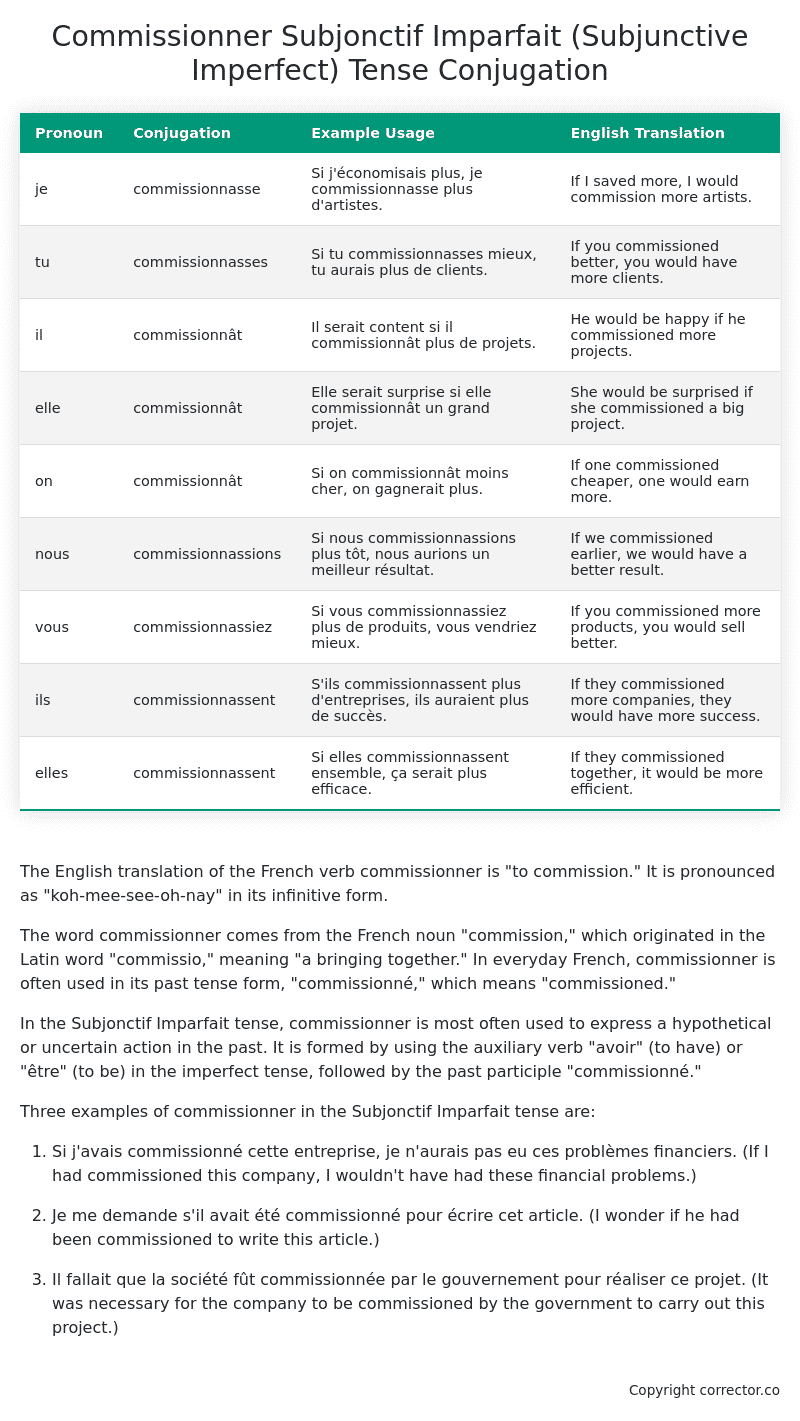Subjonctif Imparfait (Subjunctive Imperfect) Tense Conjugation of the French Verb commissionner
Introduction to the verb commissionner
The English translation of the French verb commissionner is “to commission.” It is pronounced as “koh-mee-see-oh-nay” in its infinitive form.
The word commissionner comes from the French noun “commission,” which originated in the Latin word “commissio,” meaning “a bringing together.” In everyday French, commissionner is often used in its past tense form, “commissionné,” which means “commissioned.”
In the Subjonctif Imparfait tense, commissionner is most often used to express a hypothetical or uncertain action in the past. It is formed by using the auxiliary verb “avoir” (to have) or “être” (to be) in the imperfect tense, followed by the past participle “commissionné.”
Three examples of commissionner in the Subjonctif Imparfait tense are:
-
Si j’avais commissionné cette entreprise, je n’aurais pas eu ces problèmes financiers. (If I had commissioned this company, I wouldn’t have had these financial problems.)
-
Je me demande s’il avait été commissionné pour écrire cet article. (I wonder if he had been commissioned to write this article.)
-
Il fallait que la société fût commissionnée par le gouvernement pour réaliser ce projet. (It was necessary for the company to be commissioned by the government to carry out this project.)
Table of the Subjonctif Imparfait (Subjunctive Imperfect) Tense Conjugation of commissionner
| Pronoun | Conjugation | Example Usage | English Translation |
|---|---|---|---|
| je | commissionnasse | Si j’économisais plus, je commissionnasse plus d’artistes. | If I saved more, I would commission more artists. |
| tu | commissionnasses | Si tu commissionnasses mieux, tu aurais plus de clients. | If you commissioned better, you would have more clients. |
| il | commissionnât | Il serait content si il commissionnât plus de projets. | He would be happy if he commissioned more projects. |
| elle | commissionnât | Elle serait surprise si elle commissionnât un grand projet. | She would be surprised if she commissioned a big project. |
| on | commissionnât | Si on commissionnât moins cher, on gagnerait plus. | If one commissioned cheaper, one would earn more. |
| nous | commissionnassions | Si nous commissionnassions plus tôt, nous aurions un meilleur résultat. | If we commissioned earlier, we would have a better result. |
| vous | commissionnassiez | Si vous commissionnassiez plus de produits, vous vendriez mieux. | If you commissioned more products, you would sell better. |
| ils | commissionnassent | S’ils commissionnassent plus d’entreprises, ils auraient plus de succès. | If they commissioned more companies, they would have more success. |
| elles | commissionnassent | Si elles commissionnassent ensemble, ça serait plus efficace. | If they commissioned together, it would be more efficient. |
Other Conjugations for Commissionner.
Le Present (Present Tense) Conjugation of the French Verb commissionner
Imparfait (Imperfect) Tense Conjugation of the French Verb commissionner
Passé Simple (Simple Past) Tense Conjugation of the French Verb commissionner
Passé Composé (Present Perfect) Tense Conjugation of the French Verb commissionner
Futur Simple (Simple Future) Tense Conjugation of the French Verb commissionner
Futur Proche (Near Future) Tense Conjugation of the French Verb commissionner
Plus-que-parfait (Pluperfect) Tense Conjugation of the French Verb commissionner
Passé Antérieur (Past Anterior) Tense Conjugation of the French Verb commissionner
Futur Antérieur (Future Anterior) Tense Conjugation of the French Verb commissionner
Subjonctif Présent (Subjunctive Present) Tense Conjugation of the French Verb commissionner
Subjonctif Passé (Subjunctive Past) Tense Conjugation of the French Verb commissionner
Subjonctif Imparfait (Subjunctive Imperfect) Tense Conjugation of the French Verb commissionner (this article)
Conditionnel Présent (Conditional Present) Tense Conjugation of the French Verb commissionner
Conditionnel Passé (Conditional Past) Tense Conjugation of the French Verb commissionner
L’impératif Présent (Imperative Present) Tense Conjugation of the French Verb commissionner
L’infinitif Présent (Infinitive Present) Tense Conjugation of the French Verb commissionner
Struggling with French verbs or the language in general? Why not use our free French Grammar Checker – no registration required!
Get a FREE Download Study Sheet of this Conjugation 🔥
Simply right click the image below, click “save image” and get your free reference for the commissionner Subjonctif Imparfait tense conjugation!

Commissionner – About the French Subjonctif Imparfait (Subjunctive Imperfect) Tense
Formation
Common Everyday Usage Patterns
Interactions with Other Tenses
Subjonctif Présent
Indicatif Passé Composé
Conditional
Conditional Perfect
Summary
I hope you enjoyed this article on the verb commissionner. Still in a learning mood? Check out another TOTALLY random French verb conjugation!


